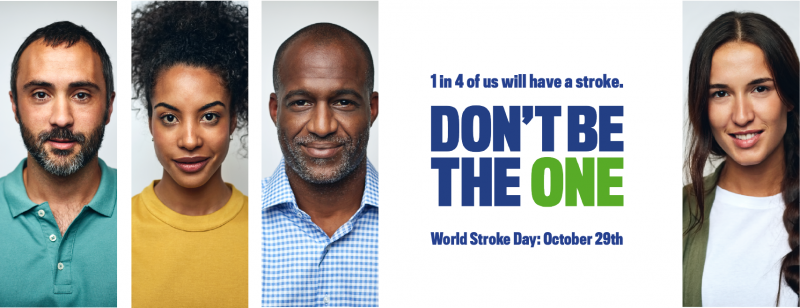
Sep 13, 2019
World Stroke Day 2019 to focus on stroke risk and prevention
The World Stroke Organization has announced the theme for World Stroke Day 2019. With a focus on stroke prevention, the ‘Don’t be the One’ campaign aims to raise awareness of our individual lifetime risk of stroke and to equip as many people as possible with potentially life-saving prevention information and tools.
The rationale for the campaign message is the recent WSO analysis of the Global Burden of Disease, which shows that globally the lifetime risk of stroke has risen and now stands at 1 in 4. Combined with the Interstroke findings that showed around 90% of strokes are linked to a small number of easily addressed risk factors, the potential impact of public understanding of stroke risk and prevention awareness is clear.
Speaking about the World Stroke Day campaign theme, World Stroke Organization Vice President and Campaign Committee co-Chair, Sheila Martins said ‘For me the 29th October is always such an exciting day for the stroke community – it’s the one day of the year that we can come together globally and to make as many people as possible aware of stroke. This year our message When it comes to stroke, think prevention – Don’t be the one.’ is relevant and essential to everyone and we look forward to seeing the stroke community taking up the campaign in countries around the world!’
Co-Chair Deidre De Silva and a leading awareness campaigner Singapore ‘Our team strived to deliver a campaign that will resonate with diverse populations around the world. Stroke is not prevented by hoping it will never happen to you. The campaign encourages everyone to be proactive by understanding their stroke risk and taking the steps to prevent stroke and its devastating consequences.’
World Stroke Day Campaign Resources
A campaign guide for members and the public will provide guidance on how to join the global prevention awareness effort. This will be available from the revamped World Stroke Day website. Members and partners will have access to campaign resources including the campaign video, gifs, editable posters, infographics, social media posts and translated prevention factsheets.
Stroke Riskometer
The Campaign team is also working in close partnership with the Stroke Riskometer team at Auckland University of Technology to promote the WSO endorsed Stroke Riskometer as a tool to understand individual stroke risk and to identify individual risk factors. Riskometer users will be encouraged to conduct their own risk assessment and to share the app on social media tagging four friends. If one person who is tagged downloads and uses the app, they will have free access to an app upgrade that will support them to take appropriate action to reduce their stroke risk.
The Campaign Committee is reaching out to members and supporters asking you to mobilise your global stroke ambassador and influencer network to help us get our potentially life-saving message to as many people as possible.
Please contact awiseman@kenes.com to dicuss further.
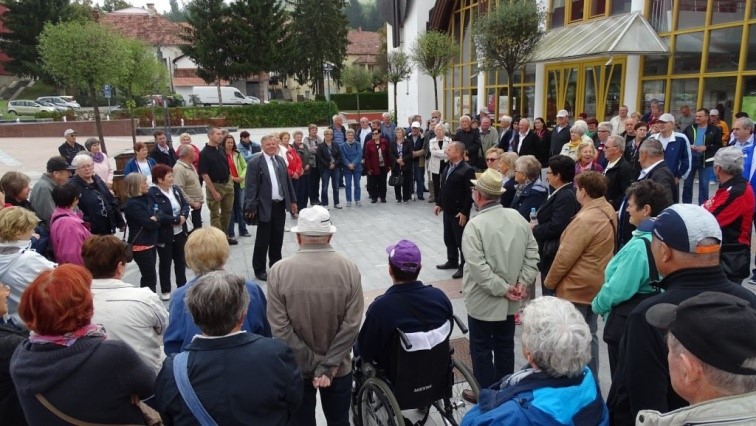
Sep 13, 2019
“Patients’ families have even less support than patients themselves and are often left alone to manage their life and organise the life of their family member with stroke.” said Milan Čuček, President of the Slovenian Stroke Support Organisation and the Vice President Tatjana Erjavec added “It is challenging for carers to assist them with integration into relevant social networks. Stroke support organisation is currently trying to bridge this gap.”
This week we are investigating what is the main after-stroke problem from the patients’ perspective in Slovenia.
SAFE: What is one issue related to the life after stroke in your country that you think needs special attention?
Stroke Care starts in hospitals and majority will have multidisciplinary teams to take care of stroke survivors. Patients with severe disabilities and rehabilitation potential will continue their rehabilitation either at the Rehabilitation Institute or in dedicated Spa’s around Slovenia. This process takes up to 6 weeks. Nowadays, stroke survivors have the possibility for ongoing visits to neurologists. Systematic rehabilitation support is, however, lacking.
Majority of stroke survivors return to their homes with limited access to further rehabilitation programmes. There is a possibility for subsides home help for maximum 20 hours per week and if medical condition requires, also visits from nurses. Primary level provides physiotherapy across Slovenia, but only on the outpatient basis and in limited amount. Occupational therapy is only available in three primary level institutions around country and it is delivered in patients’ homes. Psychology and speech therapy is virtually not available in the community. Private services are possible and this creates imbalance considering access to health services in favor of those who are financially stronger. Majority of stroke survivors are retired and with lower pensions and have therefore limited access to private therapies. In addition, it is observed that central Slovenia and bigger cities have better long-term support comparing to rural parts around country and North West part of Slovenia.
SAFE: What would be the solution, i.e. what is your organisation’s position regarding this issue?
Slovenia is a small country with population of 2 million and a good network of primary care. So far, primary care provides social service, limited access to physiotherapy and limited occupational therapy services. Ministry of Health has appointed special group, dealing with organisation of long term support for stroke survivors and creating a document for local long-term multidisciplinary stroke care. In addition, the legislation, dealing with long-term home care also includes multidisciplinary care. The challenge remains implementation of both, related to provide enough financial resources.
Slovenia has well developed Spa rehabilitation. Stroke survivors have an access to Spa rehabilitation in acute stage. Regular access to Spa rehab in sub-acute and chronic stage is not guaranteed by insurance. Stroke Support Organisation highly value this rehabilitation programs for stroke survivors and their relatives and therefore enables it for 100 members per year, being aware that this is not enough.
Ongoing support for carers is essential and it could be organised via educational sessions, self-help groups, organised respite care.
Patient organisations, providing social and health support in public interest, should have an ongoing financial support. Accessing finances via public calls requires professionally that can hardly work voluntarily all the time.
SAFE: Please tell us more about your organisation.
Slovenian Stroke Support Organisation is going to celebrate 30 years of its existence. It operates through 22 stroke clubs around Slovenia and it has 3000 members; mainly stroke survivors and relatives, but also few professionals (volunteers) and other supporters. Leaders of local stroke clubs are stroke survivors. Registered is as a Humanitarian organisation working in public interest. Main financing comes on annual basis from National lottery (FIHO). Additional income comes from local municipalities where clubs are operating, public calls for NGOs, memberships, donations and sponsorship, collaboration in research projects.
Main activities are enabling long-term rehabilitation support via SPA’s, organised physiotherapy in stroke clubs, sport activities, organized exercises (Nordic walking), organized walks. In addition, social networking, educational sessions for stroke survivors and families, organised creative workshop. In last years we provide workshops about self-care and aphasia group. Each year is organised National gathering and this year it will be in Postojna cave for over 370 members. Twice per year, journal KAPNIK is published and the website is constantly updated.
With respect to promotion we organize several events, including traditional walk around Ljubljana, for the European stroke day. Several events are also organized around World Stroke Day. The WSO has given award to our SSO for the best campaign in high income countries for year 2018.
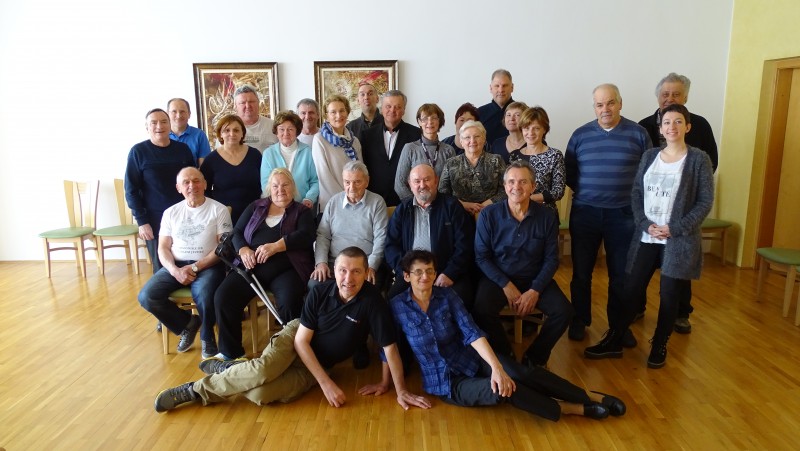
Sep 11, 2019
SAFE is delighted to share the news of Stroke Society of Slovenia being awarded with the World Stroke Award in the High-Income Country category.
World Stroke Awards are given to organisations and individuals who have demonstrated high levels of commitment and creativity in support of the objectives and messages of the World Stroke Campaign.
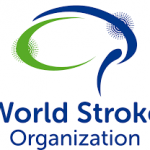 The Campaign Working Group and Committee selected the Stroke Society of Slovenia, for an award based on their impressive outreach programme and development of local partnerships that will do much to raise awareness of stroke and to build an understanding of the challenges of stroke survivors.
The Campaign Working Group and Committee selected the Stroke Society of Slovenia, for an award based on their impressive outreach programme and development of local partnerships that will do much to raise awareness of stroke and to build an understanding of the challenges of stroke survivors.
The Committee were impressed by the reach of Slovenian campaign, and strategic engagement of faith based organizations and media that will help to support future advocacy and public awareness campaigns in Slovenia.
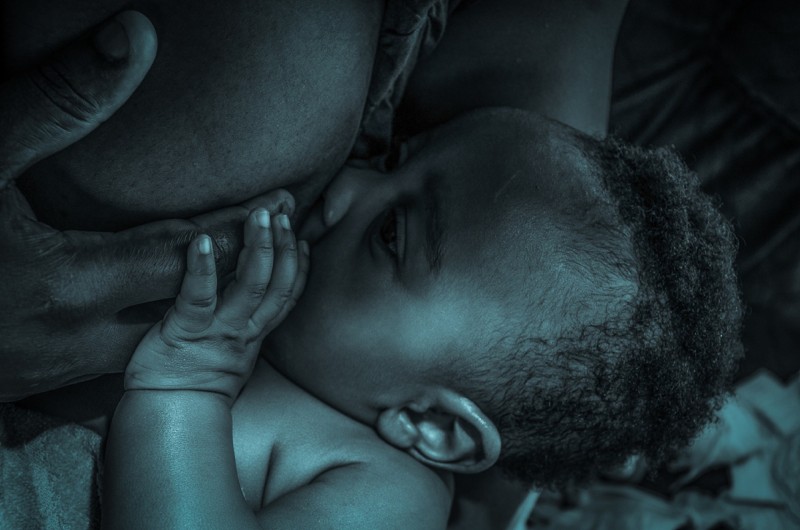
Sep 6, 2019
First published on SienceDaily
Breastfeeding is not only good for babies, there is growing evidence it may also reduce the risk for stroke in post-menopausal women who reported breastfeeding at least one child, according to new research in Journal of the American Heart Association, the Open Access Journal of the American Heart Association/American Stroke Association.
Stroke is the fourth leading cause of death among women aged 65 and older, and is the third leading cause of death among Hispanic and black women aged 65 and older, according to the study.
“Some studies have reported that breastfeeding may reduce the rates of breast cancer, ovarian cancer and risk of developing Type 2 diabetes in mothers. Recent findings point to the benefits of breastfeeding on heart disease and other specific cardiovascular risk factors,” said Lisette T. Jacobson, Ph.D., M.P.A., M.A., lead author of the study and assistant professor in the department of preventive medicine and public health at the University of Kansas School of Medicine-Wichita.
This is among the first studies to examine breastfeeding and a possible relationship to stroke risk for mothers, as well as how such a relationship might vary by ethnicity.
Researchers analyzed data on 80,191 participants in the Women’s Health Initiative observational study, a large ongoing national study that has tracked the medical events and health habits of postmenopausal women who were recruited between 1993 and 1998. All women in this analysis had delivered one or more children and 58 percent reported ever having breastfed. Among these women, 51 percent breastfed for one-six months, 22 percent for seven-12 months and 27 percent for 13 or more months. At the time of recruitment, the average age was 63.7 years and the follow-up period was 12.6 years.
After adjusting for non-modifiable stroke risk factors (such as age and family history), researchers found stroke risk among women who breastfed their babies was on average:
23 percent lower in all women,
48 percent lower in black women,
32 percent lower in Hispanic women,
21 percent lower in white women, and
19 percent lower in women who had breastfed for up to six months.
A longer reported length of breastfeeding was associated with a greater reduction in risk.
You can read the full article here.
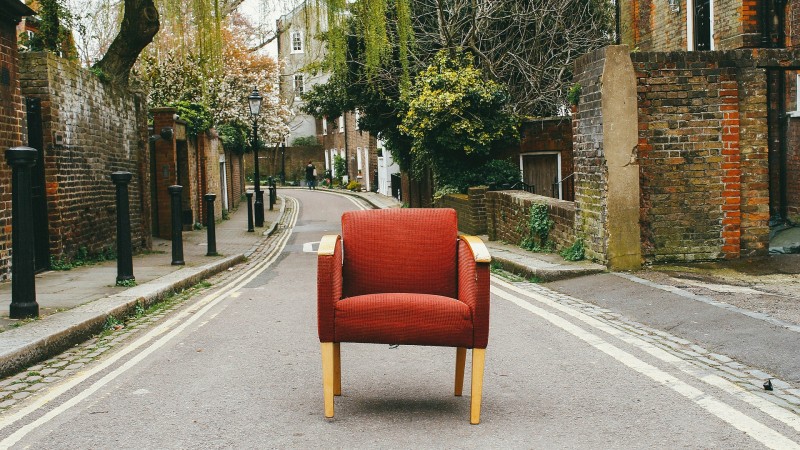
Sep 5, 2019
Did you know that sitting for long periods of time increases your risk of heart disease and stroke?
It is recommended that we get 30 minutes of moderate intensity activity at least five days a week. However, this does not cancel out the damage caused to our health by sitting for long periods of time.
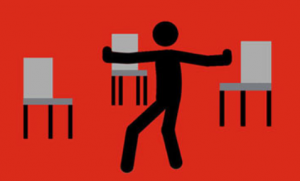 A recent survey by the Irish Heart Foundation revealed that the average person in Ireland sits down for 7.3 hours a day. The Irish Heart Foundation will run the campaign ‘Escape your Chair’ throughout the month of September. The campaign aims to inform and advise about the dangers of sitting too much and provide useful resources to help reduce your sitting time by making your working day, commute and leisure time more active.
A recent survey by the Irish Heart Foundation revealed that the average person in Ireland sits down for 7.3 hours a day. The Irish Heart Foundation will run the campaign ‘Escape your Chair’ throughout the month of September. The campaign aims to inform and advise about the dangers of sitting too much and provide useful resources to help reduce your sitting time by making your working day, commute and leisure time more active.
Helping you Escape Your Chair and move more, the campaign also aims to reduce your risk of heart disease and stroke.
To learn more about this campaign, please visit www.irishheart.ie.




 The Campaign Working Group and Committee selected the Stroke Society of Slovenia, for an award based on their impressive outreach programme and development of local partnerships that will do much to raise awareness of stroke and to build an understanding of the challenges of stroke survivors.
The Campaign Working Group and Committee selected the Stroke Society of Slovenia, for an award based on their impressive outreach programme and development of local partnerships that will do much to raise awareness of stroke and to build an understanding of the challenges of stroke survivors.

 A recent survey by the Irish Heart Foundation revealed that the average person in Ireland sits down for 7.3 hours a day. The Irish Heart Foundation will run the campaign ‘Escape your Chair’ throughout the month of September. The campaign aims to inform and advise about the dangers of sitting too much and provide useful resources to help reduce your sitting time by making your working day, commute and leisure time more active.
A recent survey by the Irish Heart Foundation revealed that the average person in Ireland sits down for 7.3 hours a day. The Irish Heart Foundation will run the campaign ‘Escape your Chair’ throughout the month of September. The campaign aims to inform and advise about the dangers of sitting too much and provide useful resources to help reduce your sitting time by making your working day, commute and leisure time more active.


